#slavery of Black people in america
Explore tagged Tumblr posts
Text
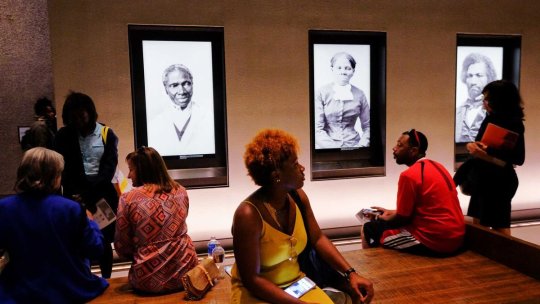
The portraits of Sojourner Truth, Harriet Tubman, and Frederick Douglass hang on the walls of the Smithsonian Institution’s National Museum of African American History and Culture on September 24, 2016, in Washington, DC
In August 1619, the first ship with “20 and odd” enslaved Africans arrived on the shores of Virginia. Four hundred years later, we look back at this moment as the start of an enduring relationship between the founding of the United States and the unconscionable exploitation of the enslaved.
In a sweeping project published by the New York Times Magazine in August 2019 exploring the legacy of slavery, Nikole Hannah-Jones wrote, “[The enslaved] and their descendants transformed the lands to which they’d been brought into some of the most successful colonies in the British Empire. ... But it would be historically inaccurate to reduce the contributions of black people to the vast material wealth created by our bondage. Black Americans have also been, and continue to be, foundational to the idea of American freedom.”
Yet centuries later, the lasting impact of slavery continues to be minimized and myths continue to flourish. For instance, there’s the erasure of the many slave revolts and rebellions that happened throughout the nation, perpetuating the lie that the enslaved were docile or satisfied with their conditions. There’s also the persistent idea that black labor exploitation is over, when mass incarceration still keeps millions of black Americans behind bars and often working for “wages” that amount to less than $1 an hour. Then there’s the idea that our understanding of slavery is accurate based on what we learned in history textbooks, when in reality, misinformation continues to be taught in our public schools about slavery’s legacy.
To unpack what often gets mistold or misunderstood, we asked five historians to debunk the biggest myths about slavery. Here’s what they said, in their own words.
1) The myth that slaves never rebelled
Miseducation surrounding slavery in the US has led to an elaborate mythology of half truths and missing information. One key piece of missing history concerns slave revolts: Few history books or popular media portrayals of the trans-Atlantic slave trade discuss the many slave rebellions that occurred throughout America’s early history.
C.L.R. James’s A History of Pan African Revolt describes many small rebellions such as the Stono Plantation insurgence of September 1739 in the South Carolina colony, where a small group of enslaved Africans first killed two guards. Others joined them as they moved to nearby plantations, setting them afire and killing about two dozen enslavers, especially violent overseers. Nat Turner’s August 1831 uprising in Southampton, Virginia, where some 55 to 65 enslavers were killed and their plantations burned, serves as another example.
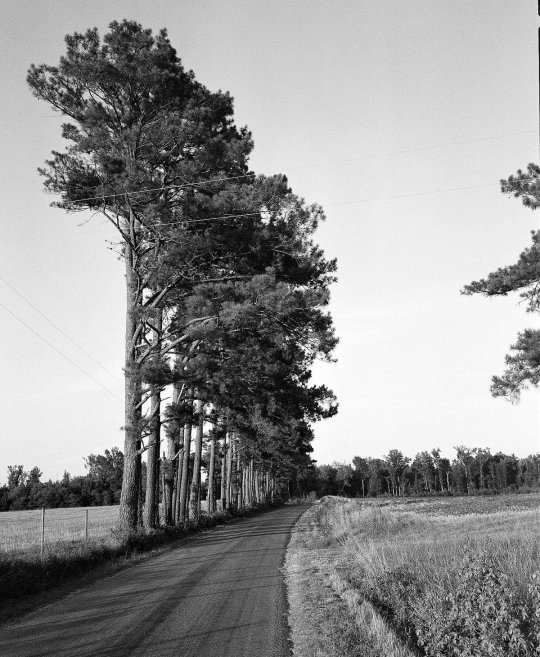
A country road follows the trail of Nat Turner’s 1831 slave rebellion in rural southeastern Virginia, June 5, 2010. On either side, farms were burned and slavers murdered as Nat Turner and his followers marched toward the town of Jerusalem, now renamed Courtland. Andrew Lichtenstein/Corbis via Getty Images
Enslaved Africans resisted and rebelled against individual slave holders and the system of slavery as a whole. Some slipped away secretly to learn to read. Many simply escaped. Others joined the abolitionist movements, wrote books, and gave lectures to the public about their experiences in captivity. And others led or participated in open combat against their captors.
Omitting or minimizing these stories of rebellion helps hide the violent and traumatic experiences enslaved Africans endured at the hands of enslavers, which prompted such revolts. If we are unaware of resistance, it is easier for us to believe the enslaved were happy, docile, or that their conditions were not inhumane. It then becomes easier to dismiss economic and epigenetic legacies of the transatlantic slave system.
Dale Allender is an associate professor at California State University, Sacramento.
2) The myth that house slaves had it better than field slaves
While physical labor in the fields was excruciating for the enslaved — clearing land, planting, and harvesting that often destroyed their bodies — that didn’t negate the physical and emotional violence enslaved women, and sometimes men and children, suffered at the hands of enslavers in their homes.
In fact, rape of black women by white enslavers was so prevalent that a 2016 study revealed 16.7 percent of African Americans’ ancestors can be traced back to Europe. One of the study’s authors concludes that the first African Americans to leave the South were those genetically related to the men who raped their mothers, grandmothers, and/or great-grandmothers. These were the enslaved African Americans within the closest proximity to and who spent the longest durations with white men: the ones who toiled in the houses of slave owners.
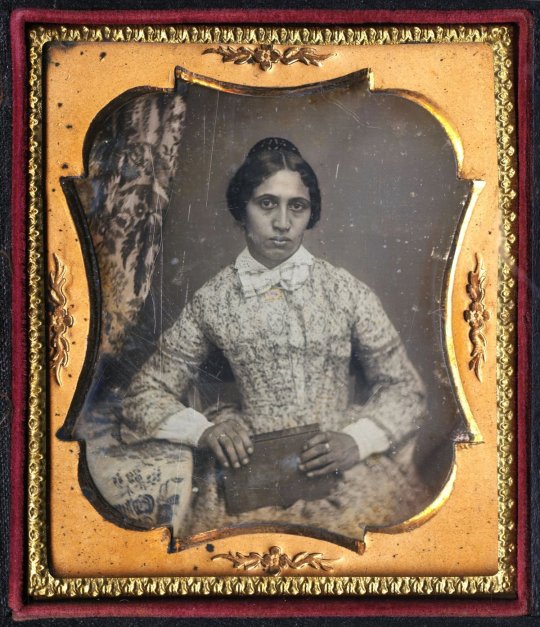
An unidentified woman poses with a book in her hands, circa 1850. The original caption identifies her only as a “freed slave.” Transcendental Graphics/Getty Images
A 2015 study determined that 50 percent of rape survivors develop PTSD. It is hard to imagine that enslaved and freedom-seeking African American survivors of rape — female, male, old, young, no matter their physical or mental abilities — did not experience further anxiety, fear, and shame associated with a condition they could not control in a situation out of control. Those African Americans with the most European ancestry, those tormented mentally, physically, emotionally, and genetically in the house, knew they had to get out. In fact, they fled the farthest — Southern whites are more closely related to blacks now living in the North than the South.
Jason Allen is a public historian and dialogue facilitator working at nonprofits, hospitals, and businesses in New York, New Jersey, and Philadelphia.
3) The myth that abolition was the end of racism
A common myth about American slavery is that when it ended, white supremacy or racism in America also ended.
Recently, Senate Majority Leader Mitch McConnell offered a familiar variant of this myth when he said he opposed reparations “for something that happened 150 years ago.” To the Kentucky Republican, a descendant of enslavers, slavery simply was, and then it just wasn’t, as though the battlefield had leveled the playing field when it came to race.
But the truth is that long after the Civil War, white Americans continue to carry the same set of white supremacist beliefs that governed their thoughts and actions during slavery and into the post-emancipation era.
In the South, especially, whites retained an enslaver’s mentality. They embraced sharecropping and convict leasing to control black labor in late 19th century, enacted Jim Crow laws to regulate black behavior in the early 20th century, and use racial terror to police the color line to this day.
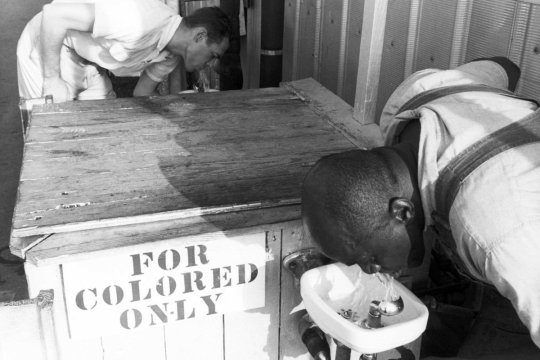
In this undated photo, two men use segregated drinking fountains in the American South. Getty Images
In the North, whites also rejected racial equality. After emancipation, they refused to make abandoned and confiscated land available to freedmen because they believed that African Americans would not work without white supervision. And when African Americans began fleeing Dixie during the Great Migration, white Northerners instituted their own brand of Jim Crow, segregating neighborhoods and refusing to hire black workers on a nondiscriminatory basis.
Slavery’s legacy is white supremacy. The ideology, which rationalized bondage for 250 years, has justified the discriminatory treatment of African Americans for the 150 years since the war ended. The belief that black people are less than white people has made segregated schools acceptable, mass incarceration possible, and police violence permissible.
This makes the myth that slavery had no lasting impact extremely consequential — denying the persistence and existence of white supremacy obscures the root causes of the problems that continue to plague African Americans. As a result, policymakers fixate on fixing black people instead of trying to undo the discriminatory systems and structures that have resulted in separate and unequal education, voter suppression, health disparities, and a wealth gap.
Something did “happen” 150 years ago: Slavery ended. But the institution’s influence on American racism and its continued impact on African Americans is still felt today.
Hasan Kwame Jeffries is an associate professor at Ohio State University.
4) The myth that history class taught us everything we needed to know about slavery
Many of us first learned about slavery in our middle or high school history classes, but some of us learned much earlier — in elementary school, through children’s books, or even Black History Month curriculum and programs. Unfortunately, we don’t always learn the entire story.
Most of us only learned partial truths about slavery in the United States. After the Civil War and Reconstruction, many in the North and South wanted to put an end to continuing tensions. But this wasn’t done just through the Compromise of 1877, when the federal government pulled the last troops out of the South; it was also done by suppressing the rights of black Americans and elevating the so-called “Lost Cause” of the enslavers.
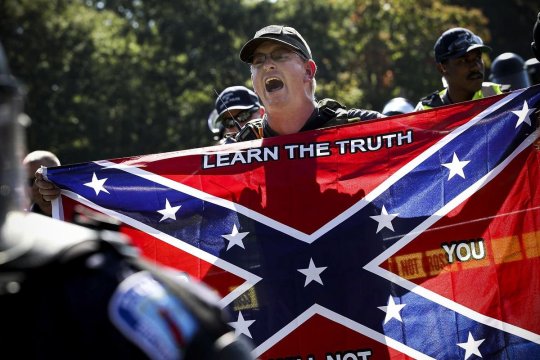
The Tennessee-based group “New Confederate State of America” held a protest in support of retaining a statue of Confederate Gen. Robert E. Lee located on Monument Avenue in Richmond, Virginia, September 16, 2017. Win McNamee/Getty Images
The Lost Cause is a distorted version of Civil War history. In the decades after the war, a number of Southern historians began to write that slaveholders were noble and had the right to secede from the Union when the North wished to interfere with their way of life. Due to efforts by a group of Southern socialites known as the United Daughters of the Confederacy, Lost Cause ideology influenced history textbooks as well as books for children and adults. The accomplishments of black Americans involved in the abolition movement, such as Frances Ellen Watkins Harper, Maria W. Stewart, Henry Highland Garnet, and William Still, were downplayed. Union generals like Ulysses S. Grant were denigrated, as were anti-racist whites from John Brown to William Lloyd Garrison. Generations later, there are still many people around the country who believe the Civil War was about states’ rights and that slaves who had good masters were treated well.
Even an accurate historical curriculum emphasizes progress, triumph, and optimism for the country as a whole, without taking into account how slavery continues to affect black Americans and influence present-day domestic policy from urban planning to health care. It does not emphasize that 12 of the first 18 presidents were enslavers, that enslaved Africans from particular cultures were prized for their skills from rice cultivation to metallurgy, and that enslaved people used every tool at their disposal to resist bondage and seek freedom. From slavery to Jim Crow to civil rights to the first black president, the black American story is forced into the story of the unassailable American dream — even when the truth is more complicated.
Given what we learn about slavery, when we learn it, and how, it is clear that everyone still has much more to learn. Teaching Tolerance and Teaching for Change are two organizations that have been wrestling with how we introduce this topic to our young. And what they’re learning is that the way forward is to unlearn.
Ebony Elizabeth Thomas is an associate professor at the University of Pennsylvania.
5) The myth that slavery doesn’t exist today
One of the greatest myths about slavery is that it ended. In fact, it evolved into its modern form: mass incarceration.
The United States has the highest prison population in the world. More than 2.2 million Americans are incarcerated; 4.5 million are on probation or parole. African Americans make up roughly 13 percent of the general population. But black men, women, and youth have outsize representation in the criminal justice system, where they make up 34 percent of the 6.8 million people who are under its control. Their labor is used to produce goods and services for businesses that profit from prison labor.

Prisoners at the Ferguson Unit, a large prison along the Trinity River in Texas, actively work the farm the prison runs, which includes planting and harvesting an annual cotton crop, 1997. The prison is located on a former cotton slave plantation. Andrew Lichtenstein/Corbis via Getty Images
For those of us who study the early history of mass incarceration in America, these statistics are not surprising. From the late 1860s through the 1920s, over 90 percent of the prison and jail populations of the South were black. Thousands of incarcerated men, women, and children were hired out by the state to private factories and farms for a fee. From sunup to sundown, they worked under the watchful eye of brutal “whipping bosses” who flogged, mauled, and murdered them. They earned nothing for their toil. Today, labor exploitation, the denial of human dignity and the right to citizenship, family separation, and violent punishment define our criminal justice system in ways that mirror slavery.
Hundreds of thousands of incarcerated people work. According to a 2017 report published by the Prison Policy Initiative, “the average of the minimum daily wages paid to incarcerated workers for non-industry prison jobs is now 86 cents.” Those assigned to work for state-owned businesses (correctional industries) earn between 33 cents and $1.41 per hour. In 2018, incarcerated Americans held a nationwide strike to end “prison slavery.” In a list of demands, striking individuals called for “all persons imprisoned in any place of detention under United States jurisdiction” to be “paid the prevailing wage in their state or territory for their labor.”
This is a year to remember slavery’s origins. It is also an opportunity to critique its legacies. Let’s not get so caught up in our efforts to commemorate slavery’s beginning that we fail to advocate for its end.
Talitha LeFlouria is the Lisa Smith Discovery Associate Professor at the University of Virginia.
Correction: An earlier version misstated the range of presidents who were enslavers. It was 12 of the first 18 presidents, not 12 of the first 16.
#5 Things People Still Get Wrong About Slavery#american racism#slavery of Black people in america#white supremacy#systemic racism#white lies about american enslavement of Black people#Black LIves Matter#White lies matter#white hate#homegrown terrorism#white lies#13th amendment#jim crow#jim crow laws#reconstruction#slavery exists in america today
2 notes
·
View notes
Text
Lets try some Logic
#blacklivesmatter#black lives matter#black people#racism#racial injustice#racial issues#oppression#antiblackness#wypipo#white supremacy#white privilege#hypocrisy#discrimination#white fragility#black history#africa#colonialism#colonial america#colonial history#slavery#jim crow#cointelpro#donald trump#election 2024#us elections#kamala harris#tulsa oklahoma#police brutality
26 notes
·
View notes
Text

#black community#original photographers#black people#artwork#graphic design#black art#black power#black history#black culture#black family#black woman#black kids#black children#black history month#blacklivesmatter#african culture#black africans#african food#african art#america#african american#africa#african#cocoa beans#cocoa powder#slavery
139 notes
·
View notes
Text
Black people and women have been overqualified for every position in America since July 3rd, 1776. It is the progress of white people and of men to finally get over their racism and misogyny that is allowing people into those spaces. Remember that.
#woke is wonderful#empathy education#fight the patriarchy#smash the patriarchy#teaching empathy#empathy#women as property#black liberation#black people#black history#black people built America#blm movement#black literature#black stories#black art#black tumblr#blacklivesmatter#black is beautiful#women in government#women as sex objects#strong women#women voters#women voting#women's suffrage#violence against women#women#black women#1776#slavery#slavery in America
48 notes
·
View notes
Text
Nightbringer is so funny bc if diavolo didn’t threaten to send us back to the human world(idk of that happens I’ve only heard) Lilith would still he here no? I don’t think she would be like a baby when they said she was reborn as a human I just assume they just put her in the world and erased her memories but she was probably reborn as a child and grew up. But she would still be around meaning that it would be so incredibly far into the past because even they had a hard time tracing MC’s lineage😭 so imagine going back to like a time before lightbulbs were invented. Absolutely the FUCK NOT!!! I could not for a second live as a small sickly Victorian child no way I would be able to survive watching people Live in their own filth😭🤢 I’m sorry i’m not witnessing slavery or the black plague Dia has me all the way fucked up I’m too spoiled by modern technology like socks and hoodies
#obey me#obey me shall we date#obey me x black reader#obey me nightbringer#nightbringer lucifer#nightbringer spoilers#om! nightbringer#nightbringer mc#nightbringer diavolo#Barbados you better take my ass home now!!#I think I would actually change the course of history#if you put me in there and I’m watching slavery happen in like real time#I am going to overthrow the Catholic Church and change Christianity and Catholicschism as we know it#i’m going to start killing priests#I’m so serious telling people to shoot Christopher Columbus on site don’t even let them step foot on America#get gone!!!#like they didn’t take baths I know they smell bad🤢#they have a bouquet of flowers at weddings because those used to be onions#to disguise the smell of how bad people smelled because weddings used to take place in the summer#and these people haven’t discovered soap yet so onions#I would literally be throwing up so quickly#And if we have a canon Lilith design I need that white women to protect me#ain’t no way
135 notes
·
View notes
Text
Did You Know About The Weeping Time ?
youtube
Take a few moments and watch this piece of american's hidden history, that is very relevant today.
Wonder why this isn't being taught in any american history books?
We are asking for Reparations, and quite frankly we should be filing some lawsuits against these slave merchants.
They are the ones who benefited most from our enslavement.
Watch, Learn and Think, because this is very relevant to the economic dis-infranchisement in american society today.
Wonder why this isn't being taught in any american history books?
COHENS, AND BUTLERS - YOUR PAYMENT IS OVERDUE
#the Weeping Time#South Carolina#slavery in South Carolina#Youtube#Reparations#Jews Selling Blacks#COHENS#AND BUTLERS - YOUR PAYMENT IS OVERDUE#BUTLERS#AMERICANS LARGEST SLAVE AUCTION#Blacks Enslaved in America#white supremacy#people on layaway
7 notes
·
View notes
Text
Say it with me now.
Enslaved 👏🏼 people 👏🏼 did👏🏼 not👏🏼 benefit 👏🏼from👏🏼 slavery!
The "skills they acquired" were things they already fucking knew.
Those skills were being taught, handed down and being used for centuries all across Africa.
To demonish centuries worth of their history to when they were enslaved is disgusting.
White people didn't teach em shit.
They wouldn't have been exploited and trafficked round the world if they didn't have no skills.
How dare you, how dare you try to brush aside 12+ generations of enslavement and brand it as "education."
Oh their were people who benefitted from slavery alright but it weren't the enslaved.
46 notes
·
View notes
Text
being angry is kinda fun tbh. ig what they is true, your anger is the emotion that cares about you the most.
#cade’s things#cade’s thoughts 💭#vent in tags#well while i’m talkin bout anger#i’ll just say things that make me angry#might make me feel better#racism in real life n in fandom#people ignoring POC because they are POC#having big breast that seem to alienate others#wanting to keep my breast the way they are but people wanting me to go against it#the fact that people whitewash slavery and black history as a whole#the fact i don’t know where i came from#my momma n my stepdad for being so selfish#america as a whole#white people idc who you are#being yelled at for my natural hair#teachers n school where they teach you bat shit#the st fandom’s homophobia n racism#not being able to keep myself afloat if i ever do leave this hell hole#my irl friends ghosting me#being treated like shit just because#being a people pleaser#having to act nice to people for they won’t explode on me or treat me like an angry black girl#being home#not being home#not being at school as my distraction#having to take care of adults twice (or more) my age because they’re so childish#white gays who act like their identity will make them oppressed
12 notes
·
View notes
Text

Happy Juneteenth! 😊
#n.e.w.s. brand#n.e.w.s.#n.e.w.s#news brand 88#n.e.w.s.brand#steer your destiny#los angeles#california#juneteenth#june 19#fba#foundational black american#black excellence#black people#slavery#usa#united states#america#united states of america#2024#summer#summer '24#88
2 notes
·
View notes
Text
Time to talk about a right-wing Reddit idiot for a change.

"Rightist", according to his flair. Thread was about reparations.
Idiot: Most black people in America aren't even descended from slaves.
Me: ...How does that work out, exactly?
Idiot: Look, the Wikipedia page says 12.6% of America is African American, and only 10.3% of black people are slave descendants, and over 80% of black people are slave descendants.
The exact Wikipedia quote he quoted:
Me: Okay, but the math doesn't work for your interpretation.

Me: 10.3 divided by 12.6 is 81.7%. That 10.3% must be compared to the overall amount of people, not compared to the overall amount of black people.
Idiot: No, I'm pretty sure it's 10.3% of black people.
Me: How, exactly? If there were enough black people who immigrated after slavery for their kids to outnumber black slave descendants 9 to 1, I think it would be easy to tell!
Me: The exact same Wikipedia page says most African-Americans are descendants of slaves! Twice!

Me: In the opening paragraphs!
Idiot: My brother in christ, those paragraphs were using the terms differently.
Me:

And that's when I decided it was a good idea to give up.
The really stupid part is that I'm still against reparations.
This was still less stupid than
the guy who implied California’s government should pay reparations for slavery, even though California never had slavery*. He said “the government” was responsible for slavery.
When I said most slave owners were private individuals, he said “well, the government still made slavery legal, right?” And bought up the Tulsa riots as an example of “generational deprivation of wealth”, a phrase he loved to use.
I said that would be like expecting the government to pay reparations to people in car accidents because driving is legal. Also, the Tulsa riots happened in another state, generation after slavery was over, and didn’t justify slavery reparations in California.
At that point, Idiot2 said Trump’s golf trips are a waste of taxpayer money, and asked me why I wasn’t complaining about that. I pointed out how he was trying to change the subject, and he insisted it was actually the same subject.
Idiot2 never backs up his claims, never admits he’s wrong about anything, and seems physically incapable of making a post without a personal attack, trying to put the other guy on the defensive, or both.
Frankly, I only engage with him to rile him up. Like Aridara, except stupider and even less self-aware.
* It did, but we were both under the impression it didn’t. This guy could’ve proven me wrong if he had done the slightest bit of research. However, California didn’t enforce black slavery by law, and had no slave patrols, so bringing your slaves with you was at your own risk.
This also means Idiot2′s “but muh government” argument
23 notes
·
View notes
Text
There is a misconception I have seen spread about Black history, even by some African-American historians.
This is, "African chattel slavery was the first time in history that slavery was racialized." But that is not true. Romani people were enslaved in Europe before and it was racialized chattel slavery.
Now, this misconception comes from a few places. One is that there is a history of African slaves in Europe when it was not racialized, such as the Romans. They had African people in all walks of life, and they had slavery, and people were not enslaved based on their race.
Another reason is that African chattel slavery and colonialism were a large part of the creation of modern racism.
As well, many people are unfamiliar with even basic Romani history.
If you see this myth spread, I would encourage you to correct it. I truly think people who believe this myth are well-meaning, they just don't have all the facts.
2 notes
·
View notes
Text

History of the Slave Trade: The Origins of the Slave Trade and Its Impacts Throughout History and the Present Day
by Hareth Al Bustani, Josephine Hall, Edoardo Albert
Book Overview
The transatlantic slave trade is one of the most shameful chapters in human history. Between 1500 and 1900 it's estimated that around 12 million African men, women, and children were stolen from their homes by Europeans, before being forcefully transported thousands of miles across the Atlantic. Those who survived the horrific 'Middle Passage' would then be sold, often separated from their families, and put to work as enslaved labor on plantations throughout the New World. While this inhumane trade was eventually abolished in the 19th century, the scars still remain and the lasting impact is still being felt by communities around the world. In History of the Slave Trade, we seek to tell the story of the transatlantic slave trade - from its origins to its abolition. We discover the impact on Africa, the horrors of the Middle Passage, and what life was like for millions of enslaved people. We also look to explore the legacies of slavery and how the effects are still being felt in the modern world.
CLICK THE TITLE TO DOWNLOAD FROM THE BLACK TRUEBRARY
#CLICK THE TITLE TO DOWNLOAD FROM THE BLACK TRUEBRARY#History of the Slave Trade: The Origins of the Slave Trade and Its Impacts Throughout History and the Present Day#slavery#white enslavers#Black People#slavery in america#slavery in global society#History of the Slave Trade
24 notes
·
View notes
Text
#black people#black history#blacklivesmatter#black lives matter#jim crow#slavery#civil rights movement#tulsa oklahoma#white mobs#white terrorism#black owned#black owned business#black entrepreneurs#black entrepreneurship#racism#race in america#race issues#racist
24 notes
·
View notes
Text
American history and slavery!
youtube
#culture#race#politics#black people#society#african americans#history#slavery#slavery in america#Quakers#underground railroad#Slavery In Latin America#Native American Indians#Native American Indian slave owners#black slave owners#abolition of slavery#Civil War#american revolution#Youtube
2 notes
·
View notes
Text
and a reminder that the FBI killed lots of Black activists (and MLK. i genuinely believe they killed MLK and Malcom X and it is known/confirmed that they killed several leaders and members of the Black Panthers.)
ALL governments kill activists, protestors, and occupants when they start getting too much attention or gaining too many followers. USAmericans love to make absurd, nonsensical, and pointless comparisons like these. i get so fucking tired of seeing white people bring him up all the goddamn time without knowing literally anything he said or did beyond his speech.
later in life MLK also specifically said “peaceful” protesting isn’t enough to cause change or gain support. idk how someone could be brazen enough to invoke MLK’s name or ANY Black activists when they should know good and goddamn well those activists were demonized and then murdered by the US government.
maybe if instead of using Black activists and Black suffering as a fun “gotcha” to win an arugment, someone could try to fight systemic racism or actually read or listen to anything Black people have said ever???
also fuck the israeli government and fuck their armed forces. they continue to murder Palestinians.

#i am so fucking tired of white people talking about mlk#like he fucking means anything to you#i doubt you’ve ever even actually listen to or read or watched his fucking speeches#let alone know ANYTHING about the things he said or did#and the fact that they seem to believe he was the only Black activist in american history is downright ridiculous#MLK basically said these types of people are the biggest hurdle to enacting change and equal rights#he spent his life fighting for his people’s rights#and white people love to bring him up every time black people get too ‘uppity’ about oppression they are responsible for#white people shut the fuck up about slavery and get MLK’s name out of yo goddamn mouth#palestine isn’t actually the exact same thing as the civil rights movement in america#in literally any way at all#Black people actually have nothing to do with Palestine#so maybe leave us out of the conversation? it ain’t got shit to do with us#beyond the government killing our activist leaders in cold blood
17K notes
·
View notes
Text
During slavery, some slaves were given a day of rest while others were forced to continue work. In some parts of the country, slaves were given a yule log to burn in the big house. As long as the log burned, they were granted rest during the holiday. Sometimes the log would burn until the New Year.
During the days of rest, some slaves would hold quilting bees, with both men and women. It was also sometimes tradition that slaves could keep the money they earned for the sale of goods during the holiday.
While the holiday season was meant to be a joyous occasion, slaves that worked inside the house would be worked hardest during Christmas, as many owners and their families would host Christmas parties.
The Christmas holiday would also be a time that some slaveowners gave wine and alcoholic beverages to their slaves. With business still in mind, the effects of alcohol were something unknown to many slaves, and most would overindulge. The increased lounge and slumber would discourage runaways during the break. This was a theory held by abolitionist Frederick Douglass. Despite, some slaves were given passes to see nearby relatives during Christmas time and allowed visitors from neighboring plantations.
Along with the traditions of the Christmas holiday in Western culture, slaves had dancing and singing in the slave quarters. Sometimes the white masters would come to the slave quarters to watch the celebration. Parents would give children small, homemade tokens.
Another celebration known as Jonkonnu, or a Christmas masquerade, took place on the plantations. It was a basic traveling show in which the slave would put on makeshift costumes and go from house to house to perform for gifts and money.
The traditions of Christmas during slavery were tools for celebration in the harshest working and living conditions for blacks. While the whites in the “big house” were being showered with gifts and feast, they shared a portion of those with their captives, and at the same time, used the opportunity to convince slaves that slavery was their best option for living peacefully and safely among the masters.
#Little Known Black History Fact: A Slaves’ Christmas#enslaved people in america#american history#christmas for enslaved people#american slavery
2 notes
·
View notes